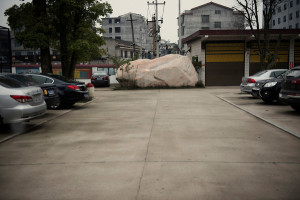
In Hunan Province, a boulder was placed outside a government building to create better feng shui for superstitious civil servants. (Gilles Sabrie for The New York Times)
Article in today’s NY Times about the use of feng shui by local Chinese government officials as a line of defense against trouble. Feng shui (风水,literally wind-water) refers to the ancient Chinese techniques of orienting physical space for maximizing good spirit energy (气,qi), resulting in improved health, prosperity, and luck. It is important for many Chinese to make sure any new building is built with good feng shui, which often means orienting the building in particular ways depending on local landmarks such as bodies of water or mountains. Using feng shui, however, is officially discouraged by the Chinese Communist Party and in fact was outlawed under Mao, as the practice was considered to be feudalistic and superstitious. As more cracks appear in the Communist Party in today’s China, feng shui is making a comeback.
The article gives a number of examples of officials enlisting the help of feng shui to deal with troublesome issues such as peasant complaints, personal problems, or corruption investigations. In Zoumajie, for example, a stone wall was built by the local land resources office in order to block the bad qi emanating from a pair of stone lions in front of a different government building. Other examples:
In 2009, county officials in the western province of Gansu spent $732,000 transporting a 369-ton boulder six miles to the county seat, a move feng shui masters said would ward off bad luck. As part of the consecration ceremony, the county magistrate walked 325 feet toward the “spirit rock,” kowtowing every three steps.
In February 2010, People’s Daily, the party’s official mouthpiece, reported that Cui Xinyuan, the party chief of Gaoyi County in Hebei Province, had installed a decommissioned fighter jet in the middle of a boulevard opposite the government headquarters so he could soar to the empyrean of Chinese power. The jet was intended to block the flow of bad luck, according to local residents, but it ultimately just blocked traffic.
In the latter case, the official’s use of a jet to counteract bad qi didn’t prevent the official from being sentenced to 13 years in prison for bribery. It turns out that hard work and honesty may actually be a better way for officials to prosper, but work is no fun and bribes can be awfully temping.